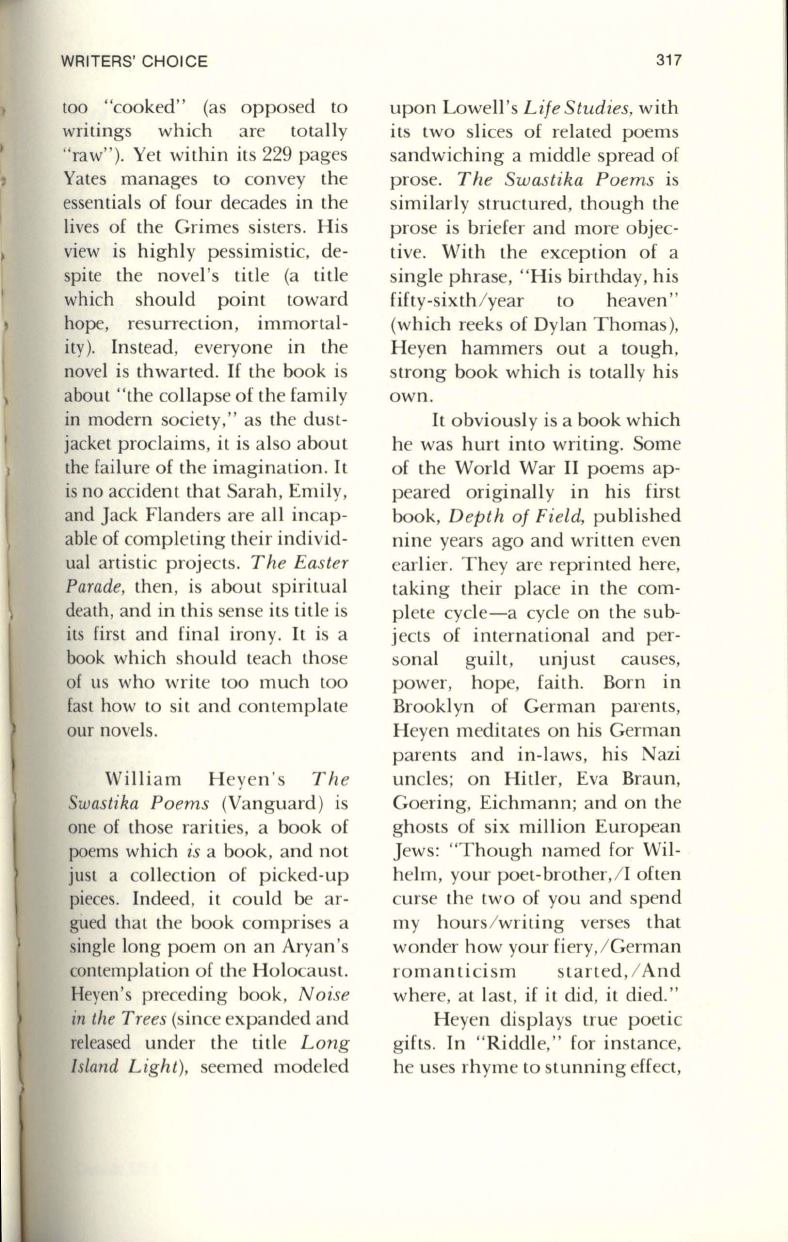
WRITERS' CHOICE
too "cooked" (as opposed to
wntmgs which are totally
"raw"). Yet within its 229 pages
Yates manages to convey the
essentials of four decades in the
lives of the Grimes sisters. His
view is highly pessimistic, de–
spite the novel's title (a title
which should point toward
hope, resurrection, immortal–
ity). Instead, everyone in the
novel is thwarted.
If
the book is
about "the collapse of the family
in modern society," as the dust–
jacket proclaims, it is also about
the failure of the imagination. It
is no accident that Sarah, Emily,
and Jack Flanders are all incap–
able of completing their individ–
ual artistic projects.
The Easter
Parade,
then, is about spiritual
death, and in this sense its title is
its first and final irony.
It
is a
book which should teach those
of
liS
who write too much too
fast how to sit and contemplate
our novels.
William Heyen's
The
Swastika Poems
(Vanguard) is
one of those rarities, a book of
poems which is a book, and not
just a collection of picked-up
pieces. Indeed, it could be ar–
gued that the book comprises a
single long poem on an Aryan's
contemplation of the Holocaust.
Heyen's preceding book,
Noise
in the Trees
(since expanded and
released under the title
Long
Island Light),
seemed modeled
317
upon Lowell's
Life Studies,
with
its two slices of related poems
sandwiching a middle spread of
prose.
The Swastika Poems
is
similarly structured, though the
prose is briefer and more objec–
tive. With the exception of a
single phrase, "His birthday, his
fifty-sixth / year
to
heaven"
(which reeks of Dylan Thomas),
Heyen hammers out a tough,
strong book which is totally his
own.
It
obviously is a book which
he was hurt into writing. Some
of the World War II poems ap–
peared originally in his first
book,
Depth of Field,
published
nine years ago and written even
earlier. They are reprinted here,
taking their place in the com–
plete cycle-a cycle on the sub–
jects of international and per–
sonal guilt, unjust causes,
power, hope, faith. Born in
Brooklyn of German parents,
Heyen meditates on his German
parents and in-laws, his Nazi
uncles; on Hitler, Eva Braun,
Goering, Eichmann; and on the
ghosts of six million European
Jews: "Though named for Wil–
helm, your poet-brother, / I often
curse the two of you and spend
my hours / writing verses that
wonder how your fiery, / German
rOmantiCIsm
started, / And
where, at last, if it did, it died."
Heyen displays true poetic
gifts. In "Riddle," for instance,
he uses rhyme to stunning effect,


